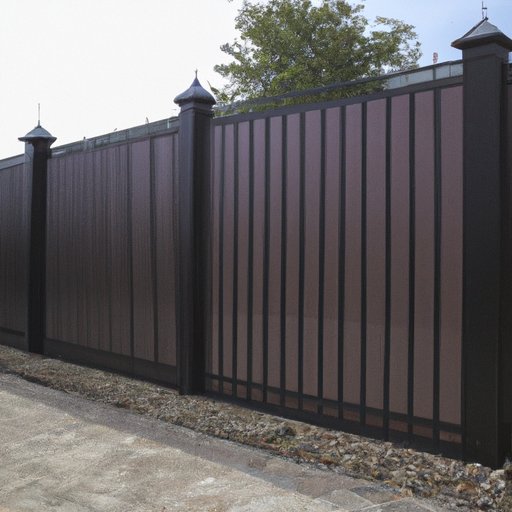Introduction
Installing a fence is one of the best ways to add security, privacy, and curb appeal to your home or property. But how much does it cost to install a fence? In this article, we explore the different costs associated with fencing materials and installation to help you make an informed decision about your fencing project.

Exploring the Different Costs of Fencing Materials
The cost of your fencing project will depend on several factors, including the type of material you choose, the size and length of the fence, and any additional features you may want to include. Let’s take a look at some of the most common fencing materials and their average costs.
Variables in Fencing Materials
The type of material you choose for your fencing project is one of the most important factors in determining the cost. There are a variety of different materials available, each with its own unique properties, advantages, and disadvantages.
In addition to the type of material, the size and length of the fence will also play a role in the overall cost. The longer the fence, the more materials you’ll need, and the more labor it will take to install it. If you’re looking for a fence with additional features, such as decorative elements or security features, these will also increase the cost.
Average Costs of Common Fencing Materials
According to HomeAdvisor, the average cost of a basic wood fence is around $1,700. If you’re looking for something a bit more durable and secure, vinyl fencing can cost up to $4,000. Aluminum fencing is another popular option, with an average cost of $2,400. Chain link fencing is one of the most affordable options, with an average cost of around $1,000.
How Much Does It Cost to Install a Fence?
In addition to the cost of the materials, there are other factors that can influence the overall cost of your fencing project. Labor costs will be a major factor, as fencing is a labor-intensive process. The location of the fence, terrain, accessibility, and type of fence will also play a role in determining the cost.
Factors that Influence the Cost of Installation
Labor costs are one of the biggest factors that influence the cost of installing a fence. Professional installers charge by the hour, so the longer the job takes, the more it will cost. The location of the fence is also important, as access to the area can affect the amount of time it takes to complete the job. Terrain can also be a factor, as fences built on hilly or uneven ground will take more time to install.
The type of fence you choose will also have an impact on the total cost. For example, installing a vinyl fence may cost more than installing a wood fence, due to the additional labor involved in cutting and fitting the materials. Similarly, installing a wrought iron fence will take more time and effort than a chain link fence.
Average Cost of Installing a Fence
On average, you can expect to pay between $1,500 and $4,000 for professional installation of a basic fence. This price range includes the cost of materials and labor, but does not include additional features or modifications.

Comparing the Prices of Different Fencing Options
When deciding which type of fence is right for you, it’s important to compare the costs of different options. Here’s a quick overview of the average costs of common fencing materials:
- Vinyl Fences: Average cost of $2,500 to $5,000
- Wood Fences: Average cost of $1,700 to $3,000
- Aluminum Fences: Average cost of $2,400 to $3,600
- Chain Link Fences: Average cost of $1,000 to $2,500
- Wrought Iron Fences: Average cost of $2,500 to $4,500
- Electric Fences: Average cost of $1,500 to $3,000
Exploring the Benefits and Costs of Installing a Fence
Installing a fence can offer a number of benefits, from increased security and privacy to improved curb appeal. However, there are also some drawbacks to consider, such as the cost of materials and installation, as well as the ongoing maintenance costs.
Advantages of Installing a Fence
A fence can provide a number of benefits, including increased security, privacy, and curb appeal. A fence can help keep intruders out, provide a barrier between you and your neighbors, and improve the look of your home or property. Additionally, a good fence can add value to your home.
Disadvantages of Installing a Fence
In addition to the initial cost of materials and installation, there are also ongoing maintenance costs to consider. Fences require regular cleaning and repairs, and certain materials, such as wood, may need to be replaced more frequently. Additionally, some local governments may impose restrictions on the types of fences you can install.
Conclusion
Installing a fence can be a great way to add security, privacy, and curb appeal to your home or property. While there are many benefits to installing a fence, it’s important to consider the cost of materials and installation, as well as the ongoing maintenance costs. By comparing the different types of fencing materials and understanding the factors that influence the cost of installation, you can make an informed decision about your fencing project.
(Note: Is this article not meeting your expectations? Do you have knowledge or insights to share? Unlock new opportunities and expand your reach by joining our authors team. Click Registration to join us and share your expertise with our readers.)
